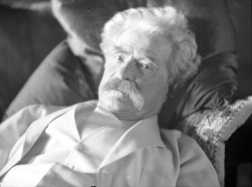BUSINESS
The alumni of Eastman College gave their annual banquet, March 30, 1901, at the Y. M. C. A. Building. Mr. James G. Cannon, of the Fourth National Bank, made the first speech of the evening, after which Mr. Clemens was introduced by Mr. Bailey as the personal friend of Tom Sawyer, who was one of the types of successful business men.

MR. CANNON has furnished me with texts enough to last as slow a speakeras myself all the rest of the night. I took exception to the introducing of Mr. Cannon as a great financier, as if he were the only great financier present. I am a financier. But my methods are not the same as Mr. Cannon's.
I cannot say that I have turned out the great business man that I thought I was when I began life. But I am comparatively young yet, and may learn. I am rather inclined to believe that what troubled me was that I got the big-head early in the game. I want to explain to you a few points of difference between the principles of business as I see them and those that Mr. Cannon believes in.
He says that the primary rule of business success is loyalty to your employer. That's all right–as a theory. What is the matter with loyalty to yourself ? As nearly as I can understand Mr. Cannon's methods, there is one great drawback to them. He wants you to work agreat deal. Diligence is a good thing, but taking things easy is much more – restful. My idea is that the employer should be the busy man, and the employee the idle one. The employer should be the worried man, and the employee the happy one. And why not? He gets the salary. My plan is to get another man to do the work for me. In that there's more repose. What I want is repose first, last, and all the time.
<img src=”https://www.bookofthrees.com/mark-twain-business/”187″ height=”182″ style=”float: left;” hspace=”6″ alt=”Mark Twain” title=”Mark Twain” border=”0″ /> Mr. Cannon says that there are three cardinal rules of business success; they are diligence, honesty, and truthfulness. Well, diligence is allright. Let it go as a theory. Honesty is the best policy–when there is money in it. But truthfulness is one of the most dangerous–why, this man is misleading you.
I had an experience to-day with my wife which illustrates this. I was acknowledging a belated invitation to another dinner for this evening, which seemed to have been sent about ten days ago. It only reached me this morning. I was mortified at the discourtesy into which I had been brought by this delay, and wondered what was being thought of me by my hosts. As I had accepted your invitation, of course I had to send regrets to my other friends.
When I started to write this note my wife came up and stood looking over my shoulder. Women always want to know what is going on. Said she "Should not that read in the third person?" I conceded that it should, put aside what I was writing, and commenced over again. That seemed to satisfy her, and so she sat down and let me proceed. I then–finished my first note–and so sent what I intended. I never could have done this if I had let my wife know the truth about it. Here is what I wrote:
TO THE OHIO SOCIETY,–I have at this moment received a most kind
invitation (eleven days old) from Mr. Southard, president; and a
like one (ten days old) from Mr. Bryant, president of the Press
Club. I thank the society cordially for the compliment of these
invitations, although I am booked elsewhere and cannot come.
But, oh, I should like to know the name of the Lightning Express by
which they were forwarded; for I owe a friend a dozen chickens, and
I believe it will be cheaper to send eggs instead, and let them
develop on the road.
Sincerely yours,
Mark TWAIN.
I want to tell you of some of my experiences in business, and then I will be in a position to lay down one general rule for the guidance of those who want to succeed in business. My first effort was about twenty-five years ago. I took hold of an invention–I don't know now what it was all about, but some one came to me tend told me it was a good thing, and that there was lots of money in it. He persuaded me to invest $15,000, and I lived up to my beliefs by engaging a man to develop it. To make a long story short, I sunk $40,000 in it.
Then I took up the publication of a book. I called in a publisher and said to him: "I want you to publish this book along lines which I shall lay down. I am the employer, and you are the employee. I am going to show them some new kinks in the publishing business. And I want you to draw on me for money as you go along," which he did. He drew on me for $56,000. Then I asked him to take the book and call it off. But he refused to do that.
My next venture was with a machine for doing something or other. I knew less about that than I did about the invention. But I sunk $170,000 in the business, and I can't for the life of me recollect what it was the machine was to do.
I was still undismayed. You see, one of the strong points about my business life was that I never gave up. I undertook to publish General Grant's book, and made $140,000 in six months.
My axiom is, to succeedin business: avoid my example.






























